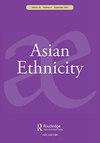Anticommunism, Sinocentrism, and elite Chinese identity: the 1957 Declaration of the First Convention of Chinese Schools in the Philippines
IF 0.8
Q3 ETHNIC STUDIES
引用次数: 0
Abstract
ABSTRACT In April 1957, Chinese educators from across the Philippines gathered in Manila for the First Convention of Chinese Schools in the country. This article comprises a translation of and commentary on the declaration that was published to commemorate the occasion. I use it to illustrate the little-known extent to which elite-authored Chinese identity in the Philippines was deeply infused with a particular strain of Cold War ideology that emphasized unyielding support for the Republic of China (ROC) on Taiwan and Sinocentrism. Texts such as these call attention to the Philippines as a largely neglected site for historicizing and differentiating among Southeast Asia’s Chinese communities after 1945. Read carefully and contextually, they offer a very different perspective on identity formation within these societies from that found in mainstream, typically Malaya-focused narratives of cultural hybridization, localization, and depoliticization.反共产主义、中国中心主义与精英华人身份——1957年菲律宾华人学校第一次会议宣言
摘要1957年4月,来自菲律宾各地的华文教育工作者齐聚马尼拉,参加首届华文学校大会。这篇文章包括对为纪念这一时刻而发表的宣言的翻译和评论。我用它来说明一个鲜为人知的程度,即菲律宾精英作家的中国身份在多大程度上深深融入了冷战意识形态,强调在台湾和中国中心主义问题上对中华民国的坚定支持。像这样的文本引起了人们对菲律宾的关注,菲律宾在1945年后成为东南亚华人社区历史化和差异化的一个基本上被忽视的地方。仔细阅读并结合上下文,它们对这些社会中的身份形成提供了一个与主流的、典型的以马来亚为中心的文化杂交、本地化和非政治化叙事截然不同的视角。
本文章由计算机程序翻译,如有差异,请以英文原文为准。
求助全文
约1分钟内获得全文
求助全文
来源期刊

Asian Ethnicity
PHYSIOLOGY-
CiteScore
2.80
自引率
6.20%
发文量
27
期刊介绍:
In the twenty-first century ethnic issues have assumed importance in many parts of the world. Until recently, questions of Asian ethnicity and identity have been treated in a balkanized fashion, with anthropologists, economists, historians, political scientists, sociologists and others publishing their studies in single-discipline journals. Asian Ethnicity provides a cross-disciplinary, international venue for the publication of well-researched articles about ethnic groups and ethnic relations in the half of the world where questions of ethnicity now loom largest. Asian Ethnicity covers any time period, although the greatest focus is expected to be on the twentieth and twenty-first centuries.
 求助内容:
求助内容: 应助结果提醒方式:
应助结果提醒方式:


